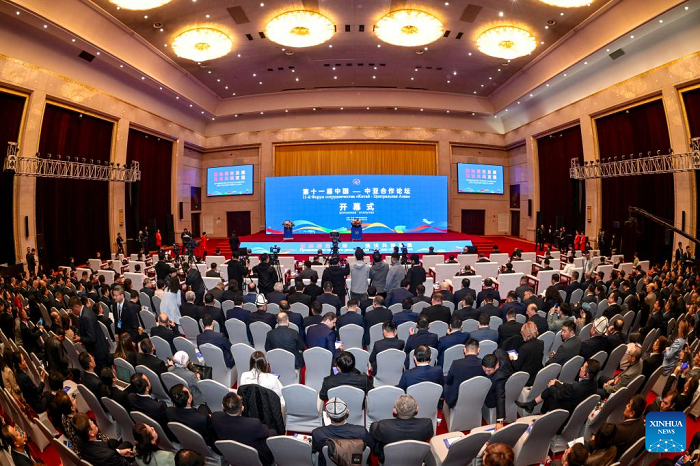TAN YINGZI and HU DONGMEI in Yinchuan
China and Central Asian countries signed 35 cooperation agreements involving trade, agriculture and sister cities worth 11.2 billion yuan ($1.6 billion) at the 11th China-Central Asia Cooperation Forum, which concluded on Sunday in Yinchuan in Northwest China’s Ningxia Hui autonomous region.
The forum also announced the Yinchuan Initiative, calling for more exchanges and cooperation in green development, smart agriculture, e-commerce and people-to-people exchanges.
Over the past 10 years, Kazakhstan, Kyrgyzstan, Tajikistan, Turkmenistan and Uzbekistan have played an active role in the China-proposed Belt and Road Initiative, turning Central Asia into a demonstration zone for Belt and Road cooperation.
Ningxia, with a population of over 7 million, also plays a key role in the BRI.
Golib Nematov, an official from Uzbekistan’s Samarkand region, called the forum a “very good platform” for cooperation and dialogue. “It has created a lot of opportunities for us. I hope we can continue and deepen this kind of cooperation model,” he said.
Nematov said this was his second visit to Ningxia, and that both sides have been working together in many areas such as agriculture, logistics, construction and tourism. “I found that Ningxia pays great attention to green development and, hopefully, we can further expand our cooperation in this area,” he added.
Central Asia is an important trade partner and source of tourists for Ningxia. In the past decade, the autonomous region’s total imports and exports with the five countries reached 1.89 billion yuan.
Wu Yingqin, executive director of the secretariat of the China-Central Asia cooperation mechanism, said that Ningxia boasts a strategic location in the New International Land-Sea Trade Corridor and has strength in agriculture and new energy as well as rich experience in poverty alleviation.
“This forum could provide the region with a lot of opportunities to work with Central Asian countries. They are very interested in smart agriculture, photovoltaic power and the Fujian-Ningxia model of poverty alleviation,” Wu added.
Established in March in Xi’an, Shaanxi province, the secretariat aims to make preparations for the China-Central Asia summit, promote the implementation of the consensuses reached by the heads of state of the six countries, and serve the foreign ministers’ meeting and the cooperation mechanism in key areas.
The forum, which was themed “Promoting Green Development and Building a Common Home”, attracted more than 300 Chinese and foreign representatives. It featured subforums on industrial green development, modern agriculture and technological innovation, sister city cooperation and cultural exchange, and regional cooperation. [China Daily]
Experts hail regional tech exchange at China-Central Asia Cooperation Forum
Experts and scholars from central Asian countries hailed sustained and greater cooperation in science and technology at the 11th China-Central Asia Cooperation Forum, which opened Saturday in Yinchuan, capital of northwest China’s Ningxia Hui Autonomous Region.
The event attracted over 300 Chinese and foreign representatives and featured an opening ceremony and four parallel sub-forums. These sessions address topics including green industrial development, modern agriculture, technological innovation, sister city cooperation and cultural exchange, and regional collaboration.
Mammetberdi Elyasov, director of the Medical and Biological Department of the Academy of Sciences of Turkmenistan, said that the event aims to further cooperation between China and Central Asian countries in digital technology.
“In 2023, Kazakhstan and China achieved significant progress in developing exchange programs for researchers and students,” said Gulnar Shaimergenova, director of Kazakhstan’s China Studies Center.
China continues to offer scholarships to students from Central Asia, which helps to strengthen the scientific ties and professional capabilities of future leaders in the region, she said.
Rashid Yusupov, director of the Center for Belt and Road Studies of Kyrgyz State University, said that the “Luban Workshops” help provide technical assistance to relevant countries.
“China’s cooperation with Central Asian countries contributes to mutual development and strengthens ties in science, education, culture, and socio-economic fields, which are crucial for the stability, development, well-being, and prosperity of the entire region,” he said.
The forum is co-hosted by the Good-Neighborliness, Friendship and Cooperation Commission of the Shanghai Cooperation Organization and the People’s Government of the Ningxia Hui Autonomous Region. [Xinhua] /// Compiled by nCa, 29 October 2024
